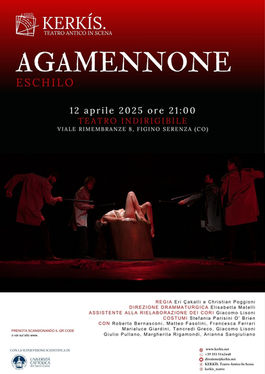
AGAMEMNON
by Aeschylus
 |  |  |  |  |  |
|---|---|---|---|---|---|
 |  |  |  |
«Assai malamente il demone ci ha colpiti con il suo artiglio pesante... »
Photos by Artphotogram
Ten years have passed since King Agamemnon left the land of Argos to avenge the abduction of the beautiful Helen, wife of his brother Menelaus, by Paris, prince of Troy. Before the army set sail, however, the soothsayer Calchas had pronounced a terrible oracular verdict: in order for the wind to finally fill the sails of the Argive ships, Agamemnon would have to sacrifice his eldest daughter, Iphigenia. The old Argives, silent witnesses to the events, remained to guard the city, watching day after day as Queen Clytemnestra's grief secretly turned into something terrible. The entire city, plunged into dense darkness, now awaits the return of its ruler...
Aeschylus' Agamemnon presents one of the greatest tragedies of classical antiquity, the meaning of which must be understood within the trilogy of which it is the first part, Aeschylus' Oresteia. According to all ancient and modern critics, this is the work that sublimely addresses some of the key themes that occupied the reflections of the archaic Greek world: the inevitability of fate, the inextricable chain of blood crimes that call for revenge, the relationship with the gods, and the birth of city law as opposed to pure natural logic.
In 2019 and 2025, the show was staged during the respective summer seasons of the Roman Theatre in Gubbio (Perugia).
In June 2025, it was among the finalists in the “Teatro sotto la luna... anche se piove” (Theatre under the moon... even if it rains) competition - Antonio Zanoletti Award.
An alternative version of the show, developed in the form of a dramatised reading and entitled La casa degli Atridi (The House of the Atreides), was hosted in Matera (European Capital of Culture 2019) during various cultural events. In 2016, it was included in an educational project promoted by the Novara Prison alongside a debate on the theme of violence and the search for identity in the prison world.
Stage direction: Eri Çakalli and Christian Poggioni
Dramaturgical direction: Elisabetta Matelli
Music: Irina Solinas





